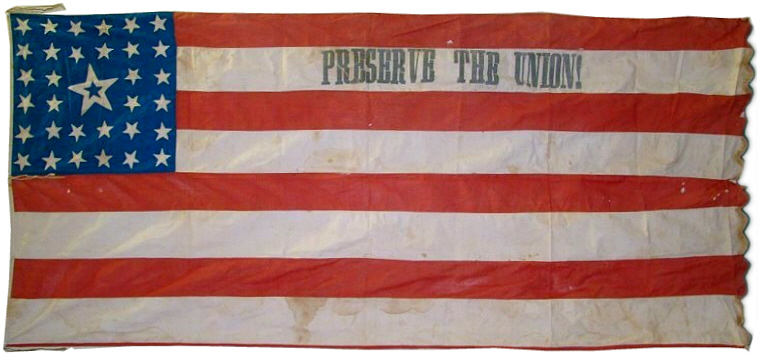|

This spectacular flag
is the first thirty-three star flag added to the Rare
Flags collection. Thirty-three star flags in general are very rare, especially
compared to other star counts of the Civil War period
(34, 35, or 36). Thirty-three star flags were only official
for two years during a pre-Civil War time where
Americans were just beginning to make and use flags to
represent their passionate feelings about the impending
war. This flag is one of the great survivors of
the Civil War era. The presence of the motto
"PRESERVE THE UNION!" may be unique to any surviving
American flag. The phrase was a rallying cry for
those Americans who did not want to see the Union
dissolve into two separate nations, and it was on this
platform that Abraham Lincoln was elected. The
symbolism in this flag runs deep. It's debatable whether
or not what I describe here was fully intended by the
maker of the flag, but given the consistent theme of the
flag, to "Preserve the Union", I believe that much, if
not all, of the symbolism was intentional.
The flag is homemade,
possibly made for the election of 1860 or following
the attack on Fort Sumter in April 1861. It has
the qualities of a political banner in the style of a
flag. The flag itself well represents its motto. The
canton, representing the Union, and the stripes,
representing the Confederacy, are preserved in unity as
one flag. The pattern of the stars is the known as
the "phalanx" pattern, which is a word that traces its
roots to early military history, where soldiers would
arrange themselves in a boxed pattern to protect the
center. Here, we see an outer box of slightly
larger stars, surrounding an inner box of 13 stars (12
in the inner box, consisting of slightly smaller stars,
and one large center star). The symbolism is
perhaps representative of protecting the ideals of the
original 13 colonies. The canton also sits
on the red stripe, also known as the "war stripe", which
is another very rare trait in early American flags.
While I believe that in some cases, on some flags, this
is unintentional and simply an oversight by the maker of
the flag, it's very likely that its use on this flag, at
the commencement of war within the country itself, is
intentional. Although it's tempting to attribute
the unusual 8 stripes to possibly be symbolic of the
Confederacy, I believe the height of the stripes was
simply based on the height of the stencils used to make
the lettering, and the 8 stripes resulted in a well
proportioned flag relative to the height of the canton.
While the quote "Preserve
the Union!" was a common rally cry and sentiment, the
phrase was famously spoken by President Andrew Jackson
when he fought against nullification:
"I feel in the depths of my soul that it is
the highest, most sacred, and most
irreversible part of my obligation to
preserve the union of these states, although
it may cost me my life."
|
| |
|
-
President Andrew Jackson |
Taken together, the
flag is highly symbolic and is one of the finest and
rarest examples of an American flag that captures
the dire circumstances surrounding the opening of a war
that threatened to tear the nation asunder. While
printed 33 star flags are scarce, I've only seen a very
small handful of 33 star flags with pieced-and-sewn
construction. There are some surviving examples
which were
later updated to 34, 35, 36 or other star counts during the
period of the war and post-war reconstruction, but very
few remain with 33 stars. The phalanx pattern and
large center halo star are also very scarce on sewn
flags of any star count. I only know of one other
sewn flag, which is post-Civil War that has a large
sewn haloed center star on it. Center stars began
to appear on printed parade flags with 30 stars,
circa 1848-1850 (IAS-00238),
and were a relatively new feature on American flags at
the time when this flag was made. The star count was
official from July 4, 1859 to July 4, 1861, though
Kansas was admitted on January 29, 1861, so the nation
actually had 34 states for more than 5 months of the
official 33 star period.
|

